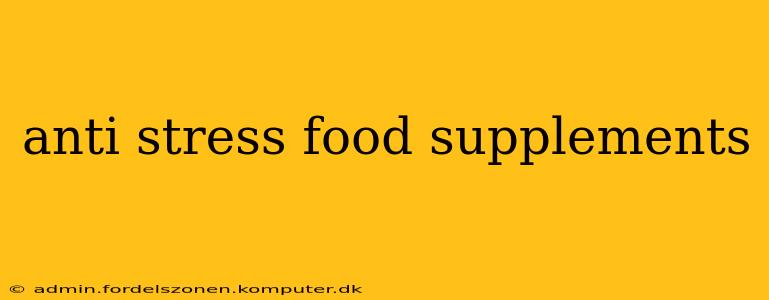Feeling overwhelmed? Stress is a part of modern life, but its long-term effects can be detrimental to your health. While lifestyle changes like exercise and meditation are crucial for stress management, many turn to food supplements for an added boost. This guide explores the world of anti-stress food supplements, clarifying what works, what doesn't, and how to choose the best option for you. Remember, this information is for educational purposes and should not be considered medical advice. Always consult your doctor before starting any new supplement regimen.
What are the Best Anti-Stress Food Supplements?
Several supplements are marketed for stress relief, but the evidence supporting their efficacy varies. Some of the most commonly discussed include:
-
Magnesium: This essential mineral plays a vital role in numerous bodily functions, including nerve and muscle function. Magnesium deficiency is linked to increased stress and anxiety. Supplements can help bridge a deficiency, potentially easing symptoms. Look for magnesium citrate, glycinate, or taurate for better absorption.
-
Ashwagandha: This adaptogenic herb has gained popularity for its stress-reducing properties. Studies suggest ashwagandha can help lower cortisol levels (the stress hormone) and improve mood. It's available in various forms, including capsules and powders.
-
Vitamin D: While not directly an "anti-stress" supplement, Vitamin D deficiency is associated with increased risk of anxiety and depression. Ensuring adequate Vitamin D levels through supplementation (or sun exposure) may indirectly contribute to better stress management.
-
Omega-3 Fatty Acids: These healthy fats, found abundantly in fish oil, are linked to improved brain function and mood regulation. They may help reduce inflammation, a factor contributing to stress-related symptoms. Look for supplements with a high concentration of EPA and DHA.
-
B Vitamins: This group of vitamins plays a crucial role in energy production and nerve function. B vitamin deficiencies can exacerbate stress symptoms, making supplementation beneficial for some individuals. A B-complex vitamin is a convenient way to address potential deficiencies.
What Supplements Should I Avoid for Stress?
While many supplements claim to alleviate stress, some lack scientific backing or may even have adverse effects. Always exercise caution and consult your doctor before taking any supplement, especially if you have underlying health conditions or are taking other medications. Avoid supplements making unsubstantiated claims, and be wary of those with excessive amounts of stimulants or other potentially harmful ingredients.
How Do Anti-Stress Supplements Work?
The mechanisms vary depending on the specific supplement. Some, like magnesium, address physiological deficiencies that contribute to stress response. Others, like ashwagandha, may work through their influence on the hypothalamic-pituitary-adrenal (HPA) axis, regulating cortisol production. Omega-3s and B vitamins support overall bodily function and may indirectly help manage stress through their role in brain health and energy production.
Are Anti-Stress Supplements Safe?
Generally, these supplements are considered safe when taken as directed. However, potential side effects exist, depending on the supplement and individual factors. Always follow recommended dosages and consult your doctor if you experience any adverse effects. Interactions with existing medications are also possible, so open communication with your healthcare provider is paramount.
What Are the Side Effects of Anti-Stress Supplements?
Side effects vary depending on the specific supplement. For example, magnesium can cause diarrhea in high doses, while ashwagandha might lead to digestive upset in some individuals. Vitamin D toxicity is possible with excessive intake. Always read the label, follow recommended dosages, and consult your doctor if you experience any unwanted effects.
Do Anti-Stress Supplements Interact With Medications?
Yes, some supplements can interact with medications. This is another reason why consulting your doctor before starting any new supplement is crucial. Certain supplements may enhance or interfere with the effects of prescribed medications, leading to potential complications.
How Long Does It Take to See Results From Anti-Stress Supplements?
The time it takes to notice effects varies depending on the supplement, dosage, and individual response. Some may provide immediate relief, while others require consistent use for several weeks or months before noticeable improvements are observed. Patience and consistency are key.
Conclusion: Finding Your Path to Calm
Anti-stress food supplements can be a valuable tool in your overall stress management strategy, but they are not a magic bullet. A holistic approach that combines lifestyle modifications with potentially helpful supplements, under the guidance of a healthcare professional, offers the best chance for long-term stress reduction and improved well-being. Remember to prioritize your physical and mental health, and consult your doctor for personalized advice.
